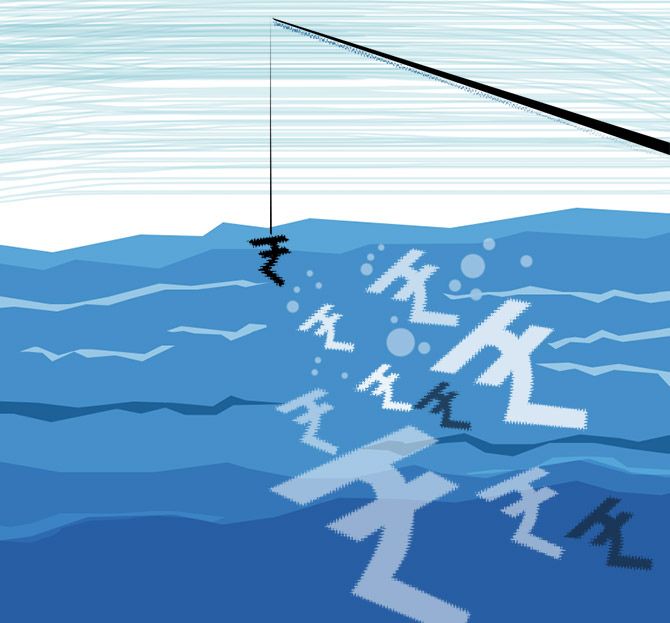Sources in the Fifteenth Finance Commission said that they will implement the provisions after the bill is enacted and the President makes a reference to it.
Illustration: Dominic Xavier/Rediff.com

The proposed Union territory (UT) of Jammu and Kashmir (J&K) will get funds from the divisible tax pool of the Centre, after recommendation of the Fifteenth Finance Commission. Funds from this source are usually given to states and not UTs.
Ladakh, the other proposed UT to be carved out of the state of J&K, too will get funds from the Centre.
These provisions have been made in The Jammu and Kashmir Reorganisation Bill, 2019, passed by Parliament on Tuesday.
“The President shall make a reference to the Fifteenth Finance Commission to include the Union territory of Jammu and Kashmir in its Terms of Reference and make award for the successor Union territory of Jammu and Kashmir,” the Bill said.
Sources in the Fifteenth Finance Commission said that they will implement the provisions after the bill is enacted and the President makes a reference to it.
This provision in the bill will remove doubts that arose from the skewed nature of J&K’s resource mobilisation - the Centre already accounts for 71 per cent of the state’s resources.
According to the provisions of the Bill, the Centre will make necessary grants for the UT of Ladakh, and also special development packages to backward areas of this region.
Given that the Centre has significant fiscal pressures of its own, experts were asking if it will be in a position to shoulder this additional burden.
The Centre has projected to bring down its fiscal deficit to 3.3 per cent of gross domestic product (GDP) in the current fiscal year (2019-20 or FY20) from 3.4 per cent in 2018-19.
The deficit stood at 61.4 per cent of the Budget Estimates in the first quarter of FY20, a bit better than 68.7 per cent at this point a year ago.
Special treatment?
Allowing the UT of J&K to access funds from the divisible pool is in contraction to the treatment given by the Commission to other UTs - such as Delhi and Puducherry - that have legislatures.
They have been asking the Commission to allow them access to funds from the divisible tax pool like states.
“We are not formally considering the memorandum of Puducherry and Delhi because under the Constitution, we are not enjoined to do so, and we have to strictly act in accordance with the Constitution,” said commission chairman N K Singh earlier.
He was referring to an amendment of the Constitution in early 2000s.
“We cannot consider demands of states that are outside the purview of our terms of reference.
"This is not our preference, it is something on which the Commission has little flexibility because we can only go by what the Terms of Reference say,” Singh said.
After meeting Singh earlier, Delhi Chief Minister Arvind Kejriwal had said till 2000, the Constitution allowed Delhi access funds in line with other states.
“However, in 2000, the Constitution was amended and Delhi was removed from the list,” a statement from Kejriwal said.
While Delhi and Puducherry are treated as UTs in this context, they are treated as states with reference to the goods and services tax.
The governments in some states and UT had jointly written to President Ram Nath Kovind seeking amendments to some of the contentious terms of reference.
A memorandum, signed by chief ministers or finance ministers of Andhra Pradesh, Puducherry, Karnataka, Delhi, West Bengal, Kerala, and Punjab, said the terms were disruptive and causes of concern.
The primary issue was that of use of the 2011 Census, but they also asked that Delhi and Puducherry be considered for devolution.
It was suggested that a “suitable amendment be made in the terms of reference to ensure that the award of Fifteenth Finance Commission must apply to UTs with legislature also.”
The Fifteenth Finance Commission’s recommendations will be for five years from the next fiscal year.
So far as the remaining period of the current fiscal year is concerned, the Bill says that the share of the J&K state between the two UTs will be determined on the basis of population.
Alternatively, the President can ask for the special award for Ladakh.












 © 2025
© 2025